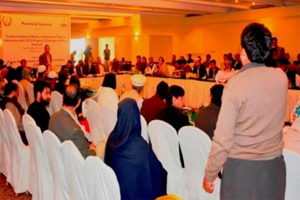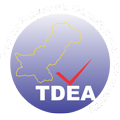The Centre for Governance and Public Accountability (CGPA), a USAID Citizens’ Voice Project partner organization, has been successfully managing a toll-free helpline to facilitate the citizens in exercising their constitutional right to information. The helpline has been functional since March 2015, when a memorandum of understanding was signed between CGPA and Khyber Pakhtunkhwa Right to Information Commission (RTIC).
The governance system in Pakistan has considerable room to strengthen its accountability mechanisms. This is especially so, since the citizens – particularly those living in the rural areas – are unaware of their constitutional and legal rights, as well as of the mechanisms to hold elected representatives and public officials accountable.
Despite a marginal but gradual improvement during the last few years, Pakistan still fares badly on the Transparency International’s Corruption Perceptions Index: it was ranked 117th of the 168 countries/territories (score: 30) in 2015, up from 139th of the 174 countries/territories (score: 30) in 2012.

The absence of effective transparency and accountability mechanisms in public institutions can be attributed to the lack of engagement between the citizens and the state. However, successive federal and provincial governments have undertaken several initiatives in the recent years to promote transparency and accountability. At the national level, the Freedom of Information Ordinance was promulgated in 2002; while, at the provincial level, the Khyber Pakhtunkhwa Right to Information Act was enacted in 2013.
USAID Citizens’ Voice Project, since its inception, has been striving to enhance citizens’ voice for improved accountability and transparency mechanisms. Under its Grants Cycle 7, it supported CGPA to implement a project in Peshawar and Mardan districts of Khyber Pakhtunkhwa province for effectuating citizens’ voice for improved public service delivery.
CGPA trained 143 male and 23 female civil society organization representatives and journalists on the effective use of the RTI law. The project developed and disseminated 6,000 copies of the RTI act, produced and aired 100 radio spots on the right to information, and raised awareness on the RTI law among 650 male and 643 female community members.
USAID Citizens’ Voice Project also supported CGPA to develop and launch a toll-free helpline that allows the citizens to dial 051-2224496 and get assistance in filing information requests to public offices. The helpline has successfully assisted the citizens in exercising their right to information, besides helping the journalist community investigate and highlight irregularities of the provincial government. Until the end of February 2016, the helpline had facilitated 545 citizens and journalists exercise their right to information.
CGPA also provided capacity-building support for the helpline, including the appointment of facilitators, acquisition of a toll-free number, and installation of the requisite hardware. In order to effectively facilitate the citizens, CGPA also provided extensive training to the appointed facilitators in the modalities of the Khyber Pakhtunkhwa Right to Information Act, 2013.
The toll-free helpline supplements USAID’s efforts to improve linkages between state and non-state entities for improved accountability. The Khyber Pakhtunkhwa Information Commissioner has lauded the initiative, saying the helpline is playing an effective role in providing timely information and support, to the citizens interested in launching complaints against public institutions. He has also promised that the Khyber Pakhtunkhwa RTI will soon get complete ownership of the helpline.




















